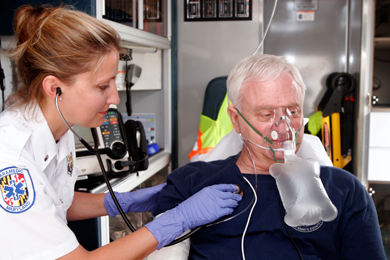National EMS Week Celebrates Life-Saving Work of Medicine’s First Responders
Lisa Booze, PharmD, CSPI, professional education and clinical coordinator for the Maryland Poison Center, explains how EMS providers can partner with poison centers to improve patients' health.
By: Malissa Carroll
Wednesday, May 22, 2013

First established by President Gerald Ford in 1974, National Emergency Medical Services (EMS) Week, celebrated May 19-25, brings together local communities and health care providers to raise awareness about safety and recognize the dedication of the members of medicine's "front line" who provide life-saving service to patients every day. The Maryland Poison Center (MPC) at the University of Maryland School of Pharmacy is staffed by pharmacists and nurses who are nationally certified as specialists in poison information and is a valuable resource for EMS providers.
The Maryland Institute for Emergency Medical Services Systems recommends that EMS providers solicit information and treatment recommendations from a local poison control center in conjunction with medical consultation when treating individuals with suspected poisonings or overdoses. Below, Lisa Booze, PharmD, CSPI, professional education and clinical coordinator for the MPC, addresses questions that those providers might have about partnering with the Poison Center to improve patients' health and well-being.
What information can MPC specialists provide to EMS personnel?
Specialists at the MPC can provide information about the assessment of poisonings, overdoses, and envenomations; range of toxicity; overdose and poisoning signs and symptoms; toxidrome identification; and specific treatment recommendations for each patient. In addition, the specially-trained pharmacists and nurses who answer calls can also offer decontamination recommendations, assistance locating antidotes and antivenom, and information about drug interactions, pill identification, and identification of chemicals that may be hazardous to first responders and providers.
What other services does the MPC offer to EMS providers?
In addition to consulting with EMS providers in the field, the MPC is actively involved in the training of EMS providers through classes, drills, continuing education presentations, and onsite training at the MPC. We also publish ToxTidbits, a monthly e-newsletter for health professionals.
How can EMS providers help the MPC?
By consulting with the MPC on all poisonings, EMS providers can help the Poison Center identify public health threats, such as terrorism and food poisoning. MPC staff can use the information received from each call to determine the effectiveness of treatments and identify where public education efforts are needed. EMS providers are vital to the MPC's effort to help the public. Educational materials, including pamphlets, telephone stickers and magnets, and posters are also available for EMS providers for school visits, health fairs, open houses, and safety days.
Is there anything else EMS providers should know about the MPC?
Not only does the MPC provide individualized treatment recommendations for each patient, but specialists can also help determine whether EMS transport is needed. In many cases, consultation with the Poison Center can avoid a trip to the hospital and save health care resources. Approximately 70 percent of all calls to the MPC are managed outside of a health care facility with poison center advice. For those situations in which EMS transport is required, MPC staff can give the best treatment advice and follow the patient through his or her hospital stay, continuing to make treatment recommendations and keep records on outcomes and treatments.
For additional information about National EMS Week, please contact the American College of Emergency Physicians at emsweek@acep.org. For more information about the services available to EMS providers through the MPC, please contact Lisa Booze at (410) 563-5583 or lbooze@rx.umaryland.edu.